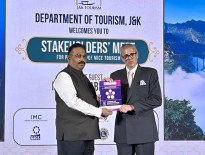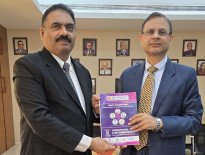Hey, like this? Why not share it with a buddy?
India’s MSMEs face financial, skill and regulatory challenges in adopting AI. Affordable, customized and cloud-based solutions offer a hopeful path forward. India’s micro, small and medium enterprises are ready to adopt AI, but the road ahead is a mix of promise and challenges. The Government’s recent report on ‘Enhancing MSMEs Competitiveness in India’ sets the stage, pointing out that while artificial intelligence holds immense promise for these businesses, adoption remains a challenge. Many enterprises, the report notes, are still unfamiliar with India’s evolving data protection laws and face uncertainty about compliance, when integrating AI into their operations. “Government-led awareness campaigns and simplified guidelines on data protection can encourage responsible AI use and reduce the risk of non-compliance,” the report recommends, underscoring the urgent need for clear, accessible information. A shortage of qualified AI professionals compounds the challenge.
Most MSMEs lack the in-house expertise to evaluate, select and implement AI solutions, making the role of collaborative platforms —those that connect MSMEs with academic institutions, AI consultants and tech companies —especially vital. The Government’s report also highlights the financial challenges. “Affordability is another persistent challenge, especially with AI tools, as computing infrastructure and training costs remain prohibitive for smaller enterprises,” the report said. It advocates for targeted financial assistance, including grants, subsidies, tax incentives and low-interest loans, as well as cloud-based, pay-as-you-go AI solutions to make advanced technologies more accessible.
India boasts a large manufacturing sector, with more than 90% of our industrial enterprises classified as MSMEs. As stated by G. Prakash, Chairperson of the Manufacturing Expert Committee, BCIC, these businesses are responsible for nearly 30% of India’s GDP, provide employment for 110 million individuals and account for 48% of India’s exports. Many MSMEs have yet to embrace digitalisation or AI, often perceiving these technologies as costly and complex,” Prakash added, as reported by Deccan Herald. “AI-driven solutions now available through affordable cloud-based and plug-and-play models can deliver productivity gains of 15% to 30%, enabling predictive maintenance, quality monitoring and energy optimisation, even in small-batch environments.” All these indicate that MSMEs want AI to be both affordable and equitably accessible and policy must keep pace.
The Modest Beginnings:
Rahul Sharma, Vice President of Sales at Salesforce India, described how AI is already beginning to change the narrative for India’s 5.93 crore MSMEs, which contribute nearly 30% of the country’s GDP. “One of the most immediate benefits of AI is the ability to take tedious, repetitive work off your team’s plate,” Sharma said, highlighting how AI-powered tools are automating routine tasks such as meeting follow-ups, status updates and reminders. This, Sharma explained, frees up MSME teams to focus on strategic priorities like customer service and market expansion. He highlighted the power of AI in quickly surfacing knowledge and insights, noting that for many small businesses, valuable information is often spread across emails, chats and various apps.
“AI can help by consolidating this information, surfacing trends and making insights easily accessible for smarter decision-making,” Sharma said, emphasising that these benefits are now within reach even for MSMEs without dedicated data teams. Sharma emphasized that AI is no longer the exclusive domain of large enterprises or data scientists. “Today’s AI tools are designed for everyday users, making it easy to streamline workflows, generate content and automate tasks with just a few clicks,” he said. Some features are already democratising AI for small businesses by allowing any team member to interact with AI agents as virtual teammates.
“This is a game-changer for MSMEs, enabling small teams to scale their capabilities with minimal resources,” he said. The customer experience is also being transformed, as AI-driven personalisation enables MSMEs to analyse customer conversations, tailor outreach and foster stronger relationships. However, Pravir Dahiya, CTO of Tata Teleservices, in a report, pointed out that many MSMEs operate with disconnected digital systems—CRM, billing, communication—leading to inefficiencies and missed opportunities. Cloud-first, AI-enabled platforms that centralise operations and automate workflows can improve agility and decision-making, especially for MSMEs with limited IT resources, Dahiya added.
Affordability:
Yet, the question of how MSMEs can affordably and sustainably access these technologies remains. Red Hat Senior Director (Technology Solutions Architecture), Mangesh Surve offered a view from the infrastructure side, noting that MSMEs overwhelmingly prefer operational expenditure (OPEX) models over capital expenditure (CAPEX), when it comes to AI adoption. He explained that MSMEs typically prefer to invest in operating expenses (OPEX) rather than making a large initial investment. He noted that these businesses often choose open-source software hosted on cloud platforms—sometimes with major global hyperscalers, but more frequently with local data center providers. This approach, he argued, is not only about cost savings and flexibility, but also about avoiding vendor lock-in.
“It’s a misnomer that open source doesn’t have an end-to-end solution. Open source, I think, for almost everything that you talk about—including AI—provides a complete end-to-end solution,” he said, pushing back against the notion that only expensive proprietary solutions can deliver comprehensive results. The roots of AI, Surve notes, are in the open-source world and today’s open-source ecosystem can fulfil the entire solution architecture requirements of MSMEs. Among the sectors leading this charge are financial services and fintech MSMEs, whose need for innovation and agility is especially acute, he observed.
Customised solutions:
Umesh Sahay, Founder & Managing Director, NES Data Pvt Ltd, observed that every MSME is different and ready-made AI tools don’t always fit their needs. Customised AI solutions, according to him, can help them solve their specific problems—whether it’s managing inventory, understanding customers better or improving productivity. “If we can build the support system, MSMEs will be able to use AI in a way that really benefits their business,” he suggested. In an ET report, Anoop G Prabhu, CTO of Vehant Technologies, stressed that MSMEs across sectors have unique AI needs. Manufacturing MSMEs may prioritise worker safety compliance and process monitoring, while logistics firms focus on PPE detection and cargo scanning. Retail MSMEs, on the other hand, require customer flow analytics, he said.
Customised, industry-specific AI solutions are essential to deliver meaningful impact across diverse use cases, he added. Government policy is beginning to address the need for awareness, skills and affordability. Technology providers are making AI both accessible and practical for non-technical users. Open-source infrastructure is offering MSMEs, the flexibility and completeness they need without locking them into costly, proprietary systems. Capturing the mood of a sector poised for transformation, Sharma concluded that “AI is no longer a technology of the future—it’s here today and it’s increasingly accessible to India’s MSMEs.”
Source : https://analyticsindiamag.com/ai-features/why-ai-is-struggling-to-charm-its-toughest-customer-indian-msmes/
Related Posts
SEARCH SME E-News
RECENT POST
- Why AI Is Struggling to Charm Its Toughest Customer- Indian MSMEs
- INTERACTIVE MEETING WITH Chairman of “Economic Advisory Council to the Prime Minister”
- SME BUSINESS FORUM MEETING
- Vedanta Metal Bazaar Records Rs.40,000 crores in Total Sales on National MSME Day
- Andhra Pradesh Chambers seek support for MSMEs
Categories
- Achievements
- Banking & Finance
- Branding & Marketing
- Business Ethics & Culture
- Business talk
- Business Tycoons
- Capital Market
- Corporate Story
- Davos
- Economy
- Emerging Market
- Entrepreneurial Leadership Dialogue
- events
- Exports
- Grievances
- Impact on Business
- Import
- India Growth Story
- Industry
- Innovation and Invention
- Innovative Ideas
- International Affairs
- International Trade
- jobs career
- Manufacturing
- Meeting
- MSME
- Others
- Packaging
- Pharma
- Policies & Schemes
- Regulatory Change
- Skill Development
- SME Talks
- Start-up
- Swot Analysis
- Tax
- Technology & Research
- Travel
- Uncategorized
- Viksit Bharat 2047- Strategies, Contribution, Initiatives and Efforts
- Women Entrepreneurs
- World Economic Forum








